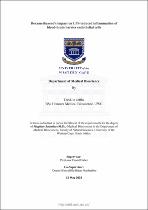| dc.contributor.advisor | Fisher, David | |
| dc.contributor.author | Jeftha, Tershlin | |
| dc.date.accessioned | 2023-11-14T08:20:04Z | |
| dc.date.available | 2023-11-14T08:20:04Z | |
| dc.date.issued | 2023 | |
| dc.identifier.uri | http://hdl.handle.net/11394/10551 | |
| dc.description | >Magister Scientiae - MSc | en_US |
| dc.description.abstract | The blood-brain barrier (BBB) serves as a protective and regulatory barrier between the blood and the brain. Microvascular endothelial cells provide homeostatic regulation of the central nervous system (CNS). BBB integrity is compromised by inflammation, which contributes to a wide range of neurological disorders. It has been shown that glucocorticoids (GCs) have anti-inflammatory functions on a variety of cells. A particular example is Dexamethasone (Dex), which is used for the treatment of inflammatory conditions and has recently been found to be effective in attenuating COVID-19. Aim: The purpose of this study was to determine whether low or high concentrations of Dex can attenuate the inflammatory response induced by LPS on the in vitro BBB model. | en_US |
| dc.language.iso | en | en_US |
| dc.publisher | University of the Western Cape | en_US |
| dc.subject | Blood-brain barrier (BBB) | en_US |
| dc.subject | Central nervous system (CNS) | en_US |
| dc.subject | Lipopolysaccharide (LPS) | en_US |
| dc.subject | COVID-19 | en_US |
| dc.subject | Induced inflammation | en_US |
| dc.title | Dexamethasone's impact on LPS-induced inflammation of blood-brain barrier endothelial cells | en_US |
| dc.rights.holder | University of the Western Cape | en_US |

